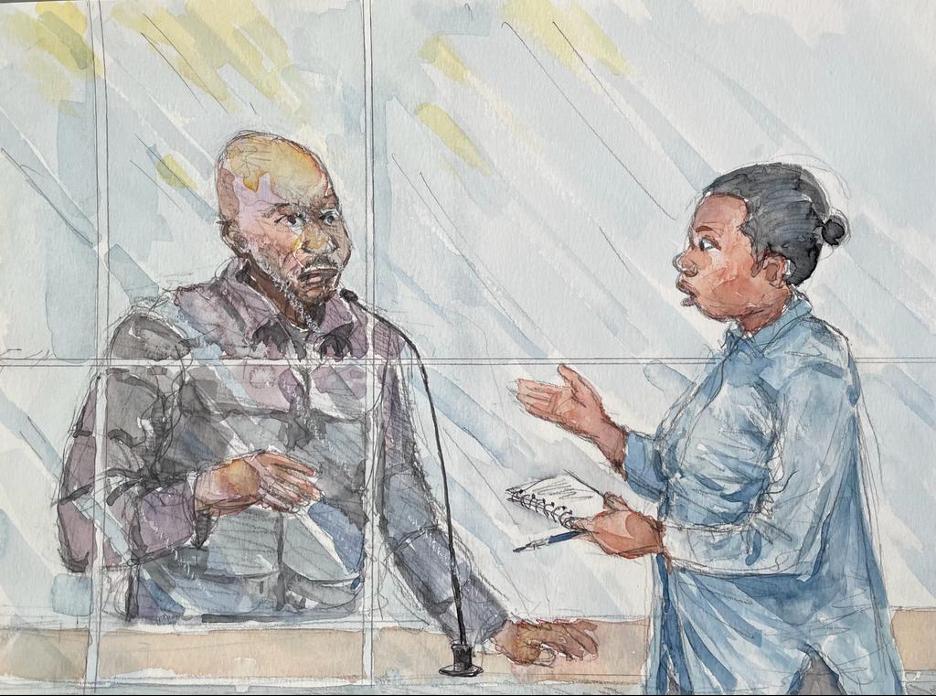Africa-Press – Liberia. Kunti Kamara inside a protective glass box as a translator translates to him during his 2022 trial
An appeal court here has upheld the 2022 conviction of Kunti Kamara, a former commander of the Ulimo rebel group, for war crimes and crimes against humanity committed in Lofa County during Liberia’s first civil war.
The court, of three judges and nine jurors, delivered the final verdict Wednesday evening following more than eight hours of deliberations. In the French judicial system the jury needed to have an innate belief in Kamara’s guilt to convict. A simple majority of jurors – seven of the 12 – needed to find him guilty for conviction.
Announcing the final verdict, the presiding judge, Jean Marc Lavergne, said Kamara has five days to lodge an appeal against the decision. The court upheld Kamara’s earlier sentence of 30 years prison. Following the verdict, the civil parties asked for 1 euro each in moral damages, as a symbolic gesture. The Court granted the request.
In a protective glass box, where he had sat throughout the hearing, Kamara looked dejected as the judge read out the jury decision, closing the chapter to his appeal. Judge Lavergne asked Kamara if he had a reaction. Kamara responded, “No, I don’t have anything else to say.” Soon afterwards he was handcuffed and led back into the holding area of the court complex to resume his sentence.
The appeal court found Kamara guilty of rape and sexual slavery committed by his subordinates; subjecting a man to severe suffering and participating in the public eating of his heart; executing a sick woman who had just lost her baby, because she was accused of witchcraft; subjecting two men to forced labor in inhumane conditions; and torturing a civilian. The crimes were found to have happened between 1993 and 1994 during the First Liberian Civil War.
A Liberian plaintiff testifies before the Appeal Court
After the hearing Sabrina Delattre, lawyer for the plaintiffs said she required court authority to comment. Alain Werner, Director of the Civitas Maximas, the non-for-profit organization that was one of the civil parties in the case and filed the complaint against Kamara in 2018, applauded the jury’s decision and the French judicial system which, he said, ensured victims and Kamara received fair legal representation.
“We are happy that the victims were believed,” Werner said. “We salute their resilience and their courage, and they came twice, some of them three times to France to be heard and today we have they were heard during the due process, so we feel this has been a fair trial.”
Alain also the outcome of this trial means a lot for ongoing discussion currently in Liberia as a bill to establish a war and economics crimes court has passed the lower house of the legislature and is being considered in the Senate.
“The political discourse has evolved in Liberia, so again this is another example for Liberia that someone who was accused of crimes in the war, he was tried with due process and we hope this inspires the Liberian parliament, the senate for the war crimes court finally to be set up.”
Throughout the four weeks of the appeal hearing, the court heard from 22 witnesses, nine civil parties, and five experts including psychologists and a psychiatrist. All of the witnesses who testified in the earlier trial in 2022 which sentenced Kamara to life imprisonment, traveled from Liberia again to testify in the appeal, except for one witness who died shortly after his return to Liberia in 2022. It also heard from contextual witnesses including former Liberia Truth and Reconciliation Commission chairs John Stewart and Massa Washington, war photographer Patrick Robert and documentarist Christophe Naigeon. Mr Kamara’s former ally, Alieu Kosiah, also came to testify. He was convicted on appeal in Switzerland to 20 years imprisonment for war crimes and crimes against humanity, for his involvement in some of the same acts for which Kamara has been found guilty.
Both Kamara and Kosiah will be eligible for early release for good behavior. Kosiah has already served ten years of his sentence and could be released as early as 2027. He would be banned from Switzerland for 10 years. With war crimes convictions neither men would be likely to obtain visas from any country and would have little choice but to return to West Africa.
This was a historic case for both France and Liberia. For France, the Kamara case was the first universal jurisdiction trial not linked to the Rwandan genocide, and with the defendant present. It was only the fifth trial of this type to take place in France. For Liberia, this verdict confirms Kamara’s 2022 conviction, which was the first ever conviction for crimes against humanity linked to the Liberian civil conflicts. Kosiah’s original guilty verdict was only for war crimes though crimes against humanity charges were added in his appeal.
In a statement Civitas Maxima said, “the conviction for complicity in crimes against humanity is particularly meaningful – Mr Kamara was found guilty to have, knowingly, facilitated the preparation or commission by his soldiers of such torture or inhumane acts, including rape and sexual abuses.”
Because of the historical relevance of the case, both the first instance proceedings and the appeal were recorded, and added to the French audiovisual archives of justice.
This was a collaboration with New Narratives as part of the West Africa Justice Reporting Project.
For More News And Analysis About Liberia Follow Africa-Press






